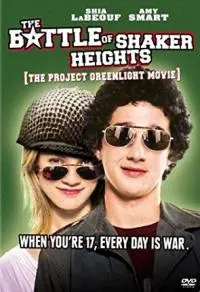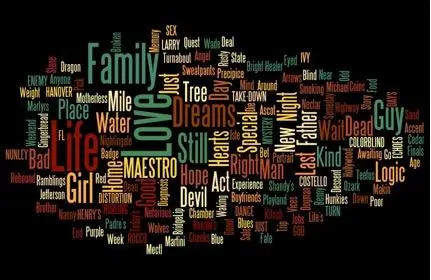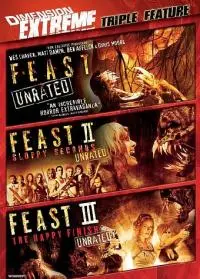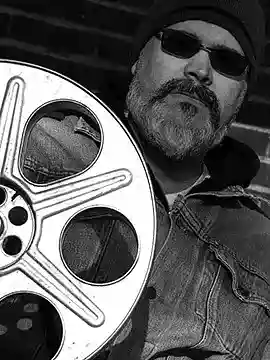You can read part 1 HERE
“It’s probably your fault.”
–Good Ass Kicking
So, like I was saying last time in Part 1, I entered Project Greenlight, and I lost. Even worse, a truly wretched movie called The Battle of Shaker Heights won. I know this because I got a lot of emails from Project Greenlight urging me to see it once the contest was over. This is the movie that introduced the world to Shia LaBeouf, by the way, something my friends blamed me for for years. But I kind of love the guy now, as he’s definitely in an interesting mid-career psychotic phase, which was a welcome switch from the plagiarism phase, which I honestly think was a result of him reading all those Project Greenlight scripts like I did and noticing all the "tributes" and recycled ideas and plots and showdowns (not that I wasn’t guilty, too, as Brickhouse had a scene ripping off the climax of Falling Down, but I swear I'd been wanting to use squirt guns in a gunfight for years. In a real gunfight, I mean).
But when you watch The Battle of Shaker Heights (kind of a YA Vietnam thing), and you realize what an obvious and humorless waffle cone it is, you start to understand that these sorts of movies are chosen for a reason.
 One, because it was perceived as harmless and easy money and a shortcut to thinking (except for the excellent Feast season!), which makes some sense when you look at the Hollywood behemoths Damon and Affleck made since they hit it big in the indies. Is anyone’s heart in the indies on purpose? In this way, it resembles the writing world, but only at first. Indie filmmakers seem to move up or perish. But this seemed like another contradiction – the whole point of the contest shouldn’t be an exercise in finding a “Hollywood” film. It should be a ridiculous roll of the dice, like the first Rocky giving anyone a chance to fight the champ (even if it just happened to be the same guy who wrote the script), which has always been more of a first-writer triumph than a cinematic triumph. Give a random crazy person a shot at the title, right? It’ll be a mess but at least it’ll be interesting. Maybe this is why the mysteriously vanishing Feast season worked so well? Because of the inherent unruliness of indie horror, as compared to indie humor? Because if it is just an attempt to discover the qualities that make a “Hollywood” movie a success, but still pattern the contest as a sifting through the silt for raw talent instead of cliché, then how can the whole process not be fucked at birth? I know this sounds like I’m bitter, but that’s just because I am. Seriously, you know why it’s called Project Greenlight? Because I’m friggin’ jealous.
One, because it was perceived as harmless and easy money and a shortcut to thinking (except for the excellent Feast season!), which makes some sense when you look at the Hollywood behemoths Damon and Affleck made since they hit it big in the indies. Is anyone’s heart in the indies on purpose? In this way, it resembles the writing world, but only at first. Indie filmmakers seem to move up or perish. But this seemed like another contradiction – the whole point of the contest shouldn’t be an exercise in finding a “Hollywood” film. It should be a ridiculous roll of the dice, like the first Rocky giving anyone a chance to fight the champ (even if it just happened to be the same guy who wrote the script), which has always been more of a first-writer triumph than a cinematic triumph. Give a random crazy person a shot at the title, right? It’ll be a mess but at least it’ll be interesting. Maybe this is why the mysteriously vanishing Feast season worked so well? Because of the inherent unruliness of indie horror, as compared to indie humor? Because if it is just an attempt to discover the qualities that make a “Hollywood” movie a success, but still pattern the contest as a sifting through the silt for raw talent instead of cliché, then how can the whole process not be fucked at birth? I know this sounds like I’m bitter, but that’s just because I am. Seriously, you know why it’s called Project Greenlight? Because I’m friggin’ jealous.
But goals of contest aside, as a screenwriter, your biggest hurdle is always going to be other screenwriters, and this is where the Project Greenlight debacle truly shines. The first stages of the contest involved voting and “coverage” of the screenplays… by other writers in the contest. Because if there’s one thing you can count on, it’s writers admitting their script is worse than someone else’s! And if you thought a writer was likely unprepared for directing, that’s nothing compared to how unprepared they seem to be judging others fairly in the same contest they are competing in. Writers are, of course, the worst, but is this even possible for actual well-adjusted human beings?
I’m unconvinced.
Some of the comments that I received from the official “feedback” forms from the six anonymous writers who supposedly read Brickhouse in its entirety (I had doubts here, too) were probably more entertaining than my script. First off there was all the overblown budget estimates, which sunk my script right off the bat. Listed under “Unique Locations a Film Crew Would Have to Go to Shoot this Film,” was a lot of “Dessert” instead of “Desert,” which, to be fair, would be very expensive, but delicious. But most of the budget overruns on my hypothetical movie were due to one particular scene in the script where a remote-control airplane flies into the prison (to smuggle in the bullet!), and the readers slash writers must have been skimming because when it gets comically swatted out of the sky by a guard’s hand, they envisioned millions of dollars spent on the destruction of a real airplane instead.
Also disheartening were the other comments under “Rate This Screenplay,” which were a variety of descriptors like “Offensive,” “Confusing,” “Pretentious,” “Gross,” “Typical,” (and that last one cut real deep back in the Fall of 2002 when I was still mainlining the Fight Club DVD). I also received several “Too Longs.” But the rest of the categories, however, were a grab bag of confusing responses, like under “What Movies Does This Resemble?” was “I wanted them all!” (huh?) or “My dog’s penis!”
And under the category “What Rating Would This Movie Receive?” was “Hate!” And under “Similar Films” was “Billy Joel’s Glass Houses.”
And under “Rate the Length of the Screenplay” was my definitely favorite response, “No, thank you.” Which I took to have two meanings, and that’s how I know I was more writer than reader.
And under “Miscellaneous Comments” was “The voice kind of killed it for me” (not sure whose voice they meant, but I always imagined gravely narration, like Gob’s most soothing serenades in Arrested Development), and the final observation that I hung onto for decades and attached ridiculous amounts of meaning to:
“I like the idea of smuggling in a bullet?”
Luckily there was some consensus under the question “Would You Pay To See This Movie?” You know the old canard about "Eskimos" having a thousand words for “Snow”? Well, writers have at least a dozen for “Nope.”
To prove my hypocrisy knows no bounds, I have no memory at all of the five screenplays I read or what I said on their feedback forms.
So, when I didn’t make the next round of finalists, where they whittled 20,000 screenplays down to 250, I studied this list like the Zapruder film, and when I read those titles over and over, looking for some sort of pattern, of course a pattern emerged. And most had those “verbing the noun” titles, a trend I mistakenly thought had been played out in the ‘90s. But to force the real pattern to emerge, I took advantage of our leap forward in technology and recently ran the Top 250 Screenplays through a word cloud…

And is it any surprise that the words that jump out are:
“Love,” “Family,” “Life,” “Dreams,” “Girl,” “Guy,” “Hearts,” “Home,” “Hope,” and, for some weird-ass reason, “Water?”
See that? Only a fool would set a story in the desert! People need water. This is common knowledge. This is also why the Great Western Comeback they’re always threatening like rain never, ever comes. And as far as the rest of those words, sadly, my screenplay contained very few, if any at all.
But seriously, what’s wrong with these words? Nothing, right? Why should somebody grouse about being unwilling to give someone what they want? For kicks, I also did a word cloud of the Good Will Hunting screenplay, figuring there might be more clues, but all the computer spit out was:
“I thought I ordered a Double Burger,” “It’s probably your fault,” and “You know why Chucky said he comes by your house every day and hopes you won’t be there? Because he’s going to rob your house!”
 Of course, those guys don’t deserve my spite. They just wrote something like I did. Hate the game, not the players, right? And, near as I can tell by typing all the titles into IMDB one night, none of those 250 screenplays got any further than that. Though there’s always the chance a title stopped “verbing the noun” and was made under a different name. But isn’t it ridiculous for me to have ever expected such a specific trajectory as Damon’s and Affleck’s (or Tarantino’s) to be duplicated? Wasn’t the inherent mediocrity of the finished products (except for Feast!) all the proof I needed? Not that the movie is even the point any more (if it ever was) as all the deadlines and in-fighting ensure that the series was always the highlight, that the making-of itself and not the movie (no accident it landed right when reality television was in the sweet spot of popularity) will always be the reason for the season and the “movies” themselves are relegated to a deleted scene on the DVD you’d never bother with.
Of course, those guys don’t deserve my spite. They just wrote something like I did. Hate the game, not the players, right? And, near as I can tell by typing all the titles into IMDB one night, none of those 250 screenplays got any further than that. Though there’s always the chance a title stopped “verbing the noun” and was made under a different name. But isn’t it ridiculous for me to have ever expected such a specific trajectory as Damon’s and Affleck’s (or Tarantino’s) to be duplicated? Wasn’t the inherent mediocrity of the finished products (except for Feast!) all the proof I needed? Not that the movie is even the point any more (if it ever was) as all the deadlines and in-fighting ensure that the series was always the highlight, that the making-of itself and not the movie (no accident it landed right when reality television was in the sweet spot of popularity) will always be the reason for the season and the “movies” themselves are relegated to a deleted scene on the DVD you’d never bother with.
But I think the most important legacy of Good Will Hunting and their subsequent contest is twofold really. First, many real-life felons continue to be captured and rehabilitated with impossible math formulas they set out like rat traps nationwide, so even if we agree the movies blow, it’s hard to argue they don’t get results. But more importantly, Good Will Hunting forever fucked us because the double origin story of its writers set us up to never be satisfied until we get commercial success, which is also the one thing originality, experimentation, and/or an idiotic sense of integrity makes damn sure you’ll never have.
And finally, the conflation of at least three origin stories here (both Damon and Affleck's) and Will Hunting's is particularly damaging. It leaves us wanting to be both the rich people made good and the janitor made good — it’s a blue-collar rejection of the standards of bourgeois intellectual culture mapped onto a wildly lucrative commercial success story that is only experienced by the already-privileged. I know that after Project Greenlight started flashing that green light for the winning screenplay, I immediately mapped myself onto Damon, who clearly mapped himself onto this character's story, which is three layers down of "unlikely."
Epilogue! For years, I drove around with the screenplay in the back seat of my car, hoping someone would ask me about it. I also had a baseball bat back there because I was getting ready for “Project Redlight” where I take the bat to Affleck’s car when he stops at an intersection. He will think I’m selling oranges. Joking!
And there are rumors of a new Project Greenlight contest coming up, I see, to be curated by Clive Barker, which sounds like they were smart to try a more genre movie again. But like a dog to its own sick, or more like Brundlefly never learning from his mistakes, they’ve returned to the formula of fusing writer and director together again. I’d complain about the impossibility of smuggling a bullet into that old tried-and-tested formula, but I’m too busy getting my pitch ready for Mr. Barker and making that little director’s square with my fingers and my thumbs every chance I get.

About the author
David James Keaton's fiction has appeared in over 100 publications, and his first collection, Fish Bites Cop! Stories to Bash Authorities, was named the 2013 Short Story Collection of the Year by This Is Horror. His second collection of short fiction, Stealing Propeller Hats from the Dead, received a Starred Review from Publishers Weekly, who said, “Decay, both existential and physical, has never looked so good.” He is also the author of the novels The Last Projector and Pig Iron (maybe soon to be a motion picture), as well as the co-editor of the upcoming anthology Hard Sentences: Crime Fiction Inspired by Alcatraz. He teaches composition and creative writing at Santa Clara University in California.








